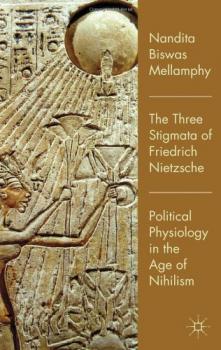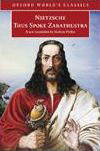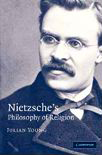- Home
- The Agonist
- Current Issue
- VOLUME V, ISSUE I, SPRING 2012
VOLUME V, ISSUE I, SPRING 2012
-
The Three Stigmata of Friedrich Nietzsche: Political Physiology in the Age of Nihilism
By Nandita Biswas Mellamphy, New York: Palgrave Macmillan, 2011
Reviewed by Julian Jason Haladyn, University of Toronto
You may download the entire book review as Adobe PDF format clicking PDF icon on the left. If you need some clarifications about copyright or usage rights, please contact us at nceditors@ietzschecircle.com.
 A battle
has been waged around Nietzsche's philosophy since at least the time of his
unfortunate collapse concerning the manner in which his ideas are framed and
interpreted, organized and understood in relation to the conditions of modern
thought, which he helped foster. The fight to have him recognized as a
philosopher whose ideas support Nazism, in which his sister Elisabeth
Förster-Nietzsche played no small role, and the subsequent recovery of his
writings from this blighted association, accomplished by among others Walter
Kaufmann, is one major example. Another key battle revolves around the question
of Nietzsche's relationship with the political. - Is Nietzsche a political
thinker? Or, stated differently, can Nietzschean thought be relevantly applied
to the development of theories of the political? Given the fact that the
philosopher did not write any overtly political texts - from a narrow
definition of the term 'political' - many commentators have declared
Nietzsche's work at best apolitical and at worst anti-political, while others -
through a hyper-extended definition - suggest his theories to be over-political
(a curious designation to say the least). This spectrum of the political, taken
not as distinct positions but as a dialogue of perspectives, represents the
critical kernel of The Three Stigmata of Friedrich Nietzsche: Political
Physiology in the Age of Nihilism in which, more than simply taking a side
in this fight, Dr. Nandita Biswas Mellamphy presents a theory of the battle
itself: questioning the question of the political in Nietzsche.
A battle
has been waged around Nietzsche's philosophy since at least the time of his
unfortunate collapse concerning the manner in which his ideas are framed and
interpreted, organized and understood in relation to the conditions of modern
thought, which he helped foster. The fight to have him recognized as a
philosopher whose ideas support Nazism, in which his sister Elisabeth
Förster-Nietzsche played no small role, and the subsequent recovery of his
writings from this blighted association, accomplished by among others Walter
Kaufmann, is one major example. Another key battle revolves around the question
of Nietzsche's relationship with the political. - Is Nietzsche a political
thinker? Or, stated differently, can Nietzschean thought be relevantly applied
to the development of theories of the political? Given the fact that the
philosopher did not write any overtly political texts - from a narrow
definition of the term 'political' - many commentators have declared
Nietzsche's work at best apolitical and at worst anti-political, while others -
through a hyper-extended definition - suggest his theories to be over-political
(a curious designation to say the least). This spectrum of the political, taken
not as distinct positions but as a dialogue of perspectives, represents the
critical kernel of The Three Stigmata of Friedrich Nietzsche: Political
Physiology in the Age of Nihilism in which, more than simply taking a side
in this fight, Dr. Nandita Biswas Mellamphy presents a theory of the battle
itself: questioning the question of the political in Nietzsche.
In this book Biswas Mellamphy persuasively argues for the annunciation - my choice of words, but I do think it is appropriate - of the political as a physiological condition in and through Nietzsche's conception of nihilism. As she states in her preface, this study aims "to bring Nietzsche's 'physiological perspective' to the question and discussion of the 'political', the 'anti-political' and the 'over-political' in Nietzsche's work" (x-xi). These form the three stigmata of Biswas Mellamphy's title. It should be noted that her title is a direct reference to Philip K. Dick's 1964 science fiction novel The Three Stigmata of Palmer Eldritch, which she proposes as a manifestation "of the critical applicability of a Nietzschean perspective," specifically "the perspective of political physiology within modern culture" (xiv). The connection among the triad of political states (political - anti-political - over-political) is made possible through the consideration of three interrelated Nietzschean concepts: great politics, eternal recurrence and the philosopher of the future. Although Biswas Mellamphy directly references the political states as the three stigmata, for me it is these three interrelated concepts (great politics - eternal recurrence - the philosopher of the future) that "are the symptoms of a bodily thought that is both a product of nihilism and a theatre of production that seeks to overcome nihilism by actively thinking through nihilism," as she describes this pathology (xviii-xix). For this reason, my discussion treats these concepts as the three stigmata of the book. In fact, one of the most compelling aspects of Biswas Mellamphy's study is the manner in which Nietzsche's thought is considered not as separate and distinct ideas but rather as a dialogue of interconnected concepts that are brought together through subjective will.
Taken together, great politics, eternal recurrence and the philosopher of the future each from a different perspective speaks to the condition of the will, a key point of intersection that Biswas Mellamphy develops in her introduction. "'Willing' becomes the hallmark of the political human, in due course becoming a symptom of its decadence as well as an active battleground for its overcoming," she writes (5). Here, as well as throughout chapter 1, Biswas Mellamphy stages the question of the political as an extension of the act of willing and its negation, which renders irrelevant the often-used dichotomy between the political and the aesthetic. As she makes clear: "The objective of this study is to show how both poles co-exist and are co-operators in Nietzsche's thought" (14). It is only by demonstrating the interconnected nature of political and aesthetic perspectives within modern culture that a 'political physiology' is possible, a task Biswas Mellamphy accomplishes through her engagement with and employment of the three Nietzschean concepts, which, again, I suggest are the three stigmata
These theoretical modes (great politics - eternal recurrence - the philosopher of the future) represent a frame through which the parameters of the political in Nietzsche are defined, specifically in terms of an active or willing relationship with nihilism. Such a relation, as Biswas Mellamphy makes clear, cannot be approached as simply conceptual but must instead be understood as an affective connection of the bodily subject. Here the current interest in affect theory and the questions related to this (general) approach to bodily responses are brought into the scope of Nietzschean thought, with Biswas Mellamphy situating affect as a correlative of will - a significant observation that, particularly given the Deleuzean presence in this area, offers a critical framework from which to go beyond a merely 'affective' reading. This consideration of Nietzsche and affect, while not an overriding concern of Biswas Mellamphy argument, is for me one of the most valuable aspects of this book since it raises a number of questions concerning the role of the political in the predominantly aesthetic - understood in a narrow (modernist) sense - treatment of affect, the two states again being approached as different perspectives on the act of willing.
Biswas Mellamphy's examination of each of the three stigmata depends upon this affective yet willing perspective - a point that is necessary if one is to appreciate the dialogic argument of this book, which cannot simply be reduced to dueling dichotomies such as the distinction between physiological and psychological perspectives. In fact, it is apparent from her approach that Biswas Mellamphy believes the question of politics in Nietzsche cannot be resolved by delimiting all aspects of the discourse to a definition of the political that is exclusionary. Nothing could be more antithetical to Nietzschean theory than the imposition of an essentialist position, especially when it attempts to divide physiology from psychology or politics from aesthetics. Biswas Mellamphy's argument for a 'political physiology' relies upon Nietzsche's engagement with and use of differing subjective poles that are constituted as a dialogue in which "the exertion of willing" not only brings (seemingly opposite) perspectives together but also is the means through which "value is created" (51). What the three Nietzschean concepts (great politics - eternal recurrence - the philosopher of the future) represent within the context of this study is an acknowledgment that Nietzschean thought is, like his own definition of the subject, multiple. It is through such (creative) conditions, facilitated by the dialogue of perspectives opened up by focusing on the affective treatment of the will, that functions as the basis for approaching the question of the political in Nietzsche.
This is why, as Biswas Mellamphy points out, Nietzsche rejects what he terms 'politics' or 'petty politics' as a conceptual state that stands apart from the subject, a deeply Hegelian perspective on the political that permeates much of modernity. Instead, Nietzsche focuses on 'culture' or 'great politics' as "grounded in the pre-eminence of his conception of body," which Biswas Mellamphy argues is the battlespace in which the question of the political must be played out (21; 25). As a necessarily affective and even aesthetic space (in the Kantian sense), the Nietzschean body must at once accept its existence as nihilistic and overcome this nihilism in order to achieve a state of will that equals (human) power, which he famously terms the will to power. "The aim of Nietzsche's elaboration of the will to power is to show that all human endeavour is fundamentally affective" (37). This description of the will to power as an affective condition of the human subject has far-reaching consequences, particularly when considered in relation to Nietzsche's definition of 'politics' as "the art of enduring the tremendous tension between differing degrees of power" (Nietzsche, The Will to Power, 719; quoted on 37). It is here that the connection between subjective affect, located as it is firmly within the notion of the body - or more appropriately within definitions of the body - and the political are subsumed into a larger consideration of creative potential that Nietzsche grants the active use of the will.
It should be noted that while Nietzsche does not define great politics, a fact that Biswas Mellamphy acknowledges in the beginning of chapter 2, the term negotiates an important territory of the will to power as a political condition predicated on the affective realities of eternal recurrence. I would like to highlight two of the more substantial descriptions of great politics provided by Biswas Mellamphy. The first is her proposal that "Nietzsche's conception of 'great politics' is grounded in the pre-eminence of his conception of body in which the superiority of the 'philosophy of the future' will lie in directly measuring and justifying the 'health' and vitality of the species in terms of the 'health' and vitality of the philosopher's innermost physiological and psychological workings" (25). It is important to note the conjunction of physiological and psychological perspectives in this quote, which function as two interrelated (affective) poles of the Nietzschean body. The second description focuses on great politics as "Nietzsche's term for the political cultivation of the Overhuman as a functional configuration of will to power" (95). Taken together, these two descriptions - along with the various other discussions of the term throughout the book - give us a picture of the boundaries of this Nietzschean vision of the political as a form of subjective dialogue, which Biswas Mellamphy establishes as the cornerstone of her argument.
Of the three stigmata (great politics - eternal recurrence - the philosopher of the future) Biswas Mellamphy's treatment of the eternal recurrence is the most compelling, particularly given its consistent discursive coupling with the will to power. As Biswas Mellamphy argues, the eternal recurrence "is a vital capacity of the will to power, which is deeply implicated in the dynamics of becoming" (6). Or, as stated later in the text: "The eternal recurrence occurs in tandem with the negation of life and the realization that the will to power (life) cannot be negated once and for all" (86). The political is in this way representative of will as a power (or greatness) that constitutes the parameters of subjectivity as multiplicity, created out of the dynamics of becoming inherent in bodily realities of human existence. Taken as a symptom of the human condition (as Arendt famously termed it), this dynamic state of becoming is the core of the political for Nietzsche because it confronts the nihilism of modern subjectivity. "The teaching of eternal recurrence thus becomes possible as the basis for 'great politics'," Biswas Mellamphy states, "if the organism that undergoes the eternal recurrence can endure, incorporate and translate these various conflicting and overpowering drives, impulses and psychological states into the affirmative language of life which will enable the creation of new values" (90). Such a creative capacity of the subject, taken as a product of nihilism, situates the notion of the 'human' in relation to the question of will and, through this, the possibility of creating new values.
This is the role of 'the philosopher of the future'. According to Nietzsche: "The philosopher as a necessary man of tomorrow and the day after tomorrow, has always found himself, and always had to find himself, in opposition to his today: the ideal of the day was always his enemy" (Nietzsche, Beyond Good and Evil, 212; quoted on 24). As a necessarily untimely position, Biswas Mellamphy proposes 'the philosopher of the future' as a perspective that allows for the incorporation of the affective and living (becoming) body into a definition of the political in Nietzsche.
Here we can see that 'political physiology' as a perspective on subjectivity does not simply question the notion of politics as a separate or distinct concept in Nietzsche's thought but rather questions the question of the political as a basis for conceiving of the full potential of the 'human' as a creative force - with the figure of the Overman representing this subjective position in which the individual becomes part of what he offer calls free spirits. 'The philosopher of the future' directly relates to this position; as Biswas Mellamphy writes: "The philosopher in its dramatization as the Overman is a regenerative force that cannot be confined to the model of 'the individual' but rather can be reconceived as the very activity of self-organization of multiplicity out of which individualization occurs" (107). The position of 'the philosopher of the future' is in this way an open answer to the question of will, in which Nietzsche allows for a (to use one of Biswas Mellamphy's subtitles) double vision in which negation and affirmation are used concurrently to conceive of the subject as at once aesthetic or creative and political. Approaching the three political states (political - anti-political - over-political) becomes a dynamic process governed by the affective capacities of the body through which the notion of 'reality' and 'illusion', a key modern problematic, are blurred - this ontological instability represents the "main conceptual problematic at the heart of Nietzsche's political physiology as outlined in this book" (110). As Biswas Mellamphy's study demonstrates, rather than a single answer for the Nietzschean question of will what we find is an endless dialogue with an equally endless capacity for new values that are made possible through great politics, experienced as a condition of eternal recurrence (as a capacity of the will to power), opening up the potential signaled by 'the philosopher of the future'.
All content copyright © Julian Jason Haladyn - Nietzsche Circle. All Rights Reserved.
The Agonist
Featured in the Agonist
-
Nietzsche, Music, and Silent Suffering An Introduction
By Yunus Tuncel, The New School University, New York City
...Focus on the impact of Nietzsche's knowledge of music on his philosophy and the development of his thought.
-
Music, Posthumanism and Nietzsche
By Stefan Lorenz Sorgner, Erlangen-Nuernberg...It has already been put forward by philosophers like Plotinus (Sorgner 2010a), Schopenhauer (Sorgner 2011) and Nietzsche (Sorgner 2006) that music is best in bringing about the dissolution of the individual....
-
On the Phenomenology of Music and Word in The Birth of Tragedy
By Babette Babich, Fordham University, New York City...Nietzsche's The Birth of Tragedy should be read as a phenomenological undertaking including his 'reduction' of traditional scholarly assumptions and theories regarding the history of the tragic work of art as well as the history and function of the tragic chorus as a musically poetic performance that can only be understood, so Nietzsche was at some pains to argue, in the full context - political and social and religious - of the life-world of Greek antiquity..
-
Thus Spoke ZarathustraBy Friedrich NietzscheA new translation by Graham Parkes
Oxford University Press, 2005
Reviewed by Horst HutterThis new translation of Nietzsche’s magnum opus is by far the best available in the English language. It should find its way to the desk of all students who do not have access to the original German.
-
Nietzsche’s Philosophy of ReligionBy Julian YoungCambridge University Press, 2006
Reviewed by Horst Hutter,
Concordia UniversityEvery student of Nietzsche in the Anglophone world should read this book. It is a most able treatment of a much-ignored and much-misunderstood topic close to the very heart of the writings of this seminal thinker.
Support Us
Please consider donating! The NC is a not-for-profit organization. As an independent organization that receives no assistance from any institution, the NC relies on your magnanimity to sustain itself. Please help support the activities of the NC with a donation Donations of any kind, whether of money, services, equipment, or in-kind gifts, are all of great necessity and deeply appreciated.
Subscribe
To receive site updates, news, and announcement from NC via email. To do so, you simply need to provide your email address below.





